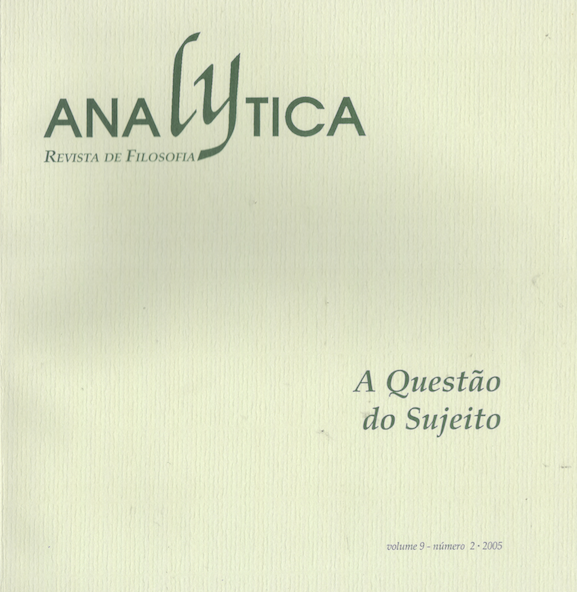O direito abstrato de Hegel. Um estudo introdutório (primeira parte)
Resumo
Este estudo introdutório ao "direito abstrato" de Hegel é um roteiro de leitura e uma interpretação da Iª Parte da Filosofia do Direito, bem como uma análise dos conceitos e das teses fundamentais, com as quais Hegel reconstrói criticamente o arcabouço filosófico do moderno direito privado, como uma forma ao mesmo tempo incontornável e insuficiente de realização da liberdade. Na primeira parte deste estudo, aqui publicada, explicam-se os vários sentidos em que esse direito é "abstrato" e a sua diferença em relação ao direito lato sensu, concebido este como o processo de objetivação e efetivação da vontade autônoma racional, cujo resultado é a esfera do espírito objetivo, coextensiva ao direito no sentido amplo (1). Ponto de partida desse processo e base de todo o direito é a personalidade jurídica, constitutiva da pessoa de direito, que é a figura jusnaturalista do indivíduo singular reconstruída especulativamente como a forma imediata e mais elementar da efetivação daquela vontade racional (2). Das relações de diversidade imediata e de indiferença entre a universalidade formal e a particularidade, enquanto momentos do conceito de vontade livre que se figura imediatamente na pessoa, Hegel deriva a diferença entre propriedade e posse, entre a igualdade formal das pessoas proprietárias e a desigualdade material da riqueza, bem como a avaliação positiva dessa igualdade formal e do formalismo do direito abstrato (3). A propriedade privada pessoal como primeira objetivação da pessoa e como expressão da "soberania" da vontade proprietária pode ser compreendida como uma radicalização especulativa da tese lockiana, segundo a qual a propriedade originária que o homem possui em sua própria pessoa é o fundamento da propriedade das coisas (4). Examinam-se, a seguir, a tensão entre propriedade privada pessoal, enquanto condição do exercício e da universalização da liberdade negativa na sociedade civil, e a função exemplar que a propriedade fundiária "livre e plena" adquire, no horizonte das reformas prussianas do latifúndio, para a compreensão do moderno proprietário rural (5). A correlação entre a inalienabilidade e imprescritibilidade dos direitos pessoais, fundados na apropriação ativa de si pelo cultivo do corpo e espírito, de um lado, e a coisificação (Versachlichung) dos produtos singulares e das próprias faculdades e disposições (contanto que para um uso limitado no tempo), enquanto "objetos de contrato", de outro, são investigadas em contraponto à avaliação jurídica e histórico-mundial da escravidão (6).
Abstract
This introductory study to Hegel's "abstract right" is a reading guide and an interpretation of the First Part of the Philosophy of Right, as well as an analysis of the concepts and of the fundamental theories with which Hegelrebuilds, in a critical manner, the philosophical outline of modern private right, as a form at the same time unavoidable and insufficient of the accomplishment of freedom. In the first past of this study, I explain the several senses in which that right is "abstract", as well as the difference between it and right in the broad sense, conceived as the process of objectivation and actualization of the rational autonomous will, whose result is the sphere of the objective spirit, co-extensive to the right in the wide sense (1). The starting point of that process, and the base of the whole right, is the juridical personality that constitutes the subject of rights, which is the jusnaturalist shape of the singular individual, speculatively rebuilt as the immediate and most elementary form of the actualization of that rational will (2). From the relations of immediate diversity and of indifference between the formal universality and the particularity, as moments of the of free will's concept that is embodied immediately in the person, Hegel derives the difference between possession and property, between the formal equality of the proprietors and the material inequality of the wealth, as well as the positive evaluation of that formal equality and of the formalism of the abstract right (3). Private personal property, as the person's first objectivation and as expression of the proprietary will's "sovereignty", can be understood as a speculative radicalization of the Lockean theory, according to which the original property that a man possesses in his own person is the foundation of the property of things (4). I examine, next, the tension between personal property, as a condition of the exercise and universalization of negative freedom in civil society, and the exemplary function that "free and full" landed property acquires, in the horizon of the Prussian reforms of the latifundium, for the understanding of the modern rural proprietor (5). Thecorrelation between the inalienability and imprescriptibility of personal rights founded in the active appropriation of himself by means of the cultivation of body and spirit, on the one hand, and the reification (Versachlichung) of singular products and of the faculties and dispositions themselves (although for a limited use in time), as "objects of contract", on the other, are investigated in counterpoint to the juridical and world-historical evaluation of slavery (6).
Downloads
Publicado
Edição
Seção
Licença
Os autores que publicam nesta revista concordam com os seguintes termos:
- Os autores mantêm os direitos autorais e concedem à revista o direito de primeira publicação, com o trabalho simultaneamente licenciado sob a Licença Creative Commons Atribuição-SemDerivações 4.0 Internacional (CC BY-ND 4.0), que permite a redistribuição, comercial ou não comercial, desde que a obra original não seja modificada e que seja atribuído o crédito ao autor.
- Os autores têm autorização para assumir contratos adicionais separadamente para distribuição não-exclusiva da versão do trabalho publicada nesta revista (ex.: publicar em repositório institucional ou como capítulo de livro), com reconhecimento de autoria e publicação inicial nesta revista.
- Os autores têm permissão e são estimulados a publicar e distribuir seu trabalho online (ex.: em repositórios institucionais ou na sua página pessoal) a qualquer ponto antes ou durante o processo editorial, já que isso pode gerar alterações produtivas, bem como aumentar o impacto e a citação do trabalho publicado (Veja O Efeito do Acesso Livre).


